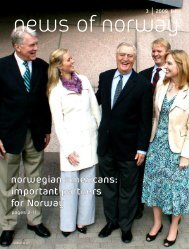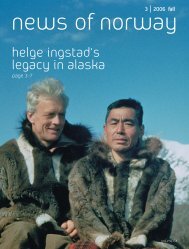Create successful ePaper yourself
Turn your PDF publications into a flip-book with our unique Google optimized e-Paper software.
society & policy<br />
PHOTO BY SIRI WOLLAND/MINISTRY OF CHILDREN AND EQUALITY<br />
“<br />
Promoting Women by Involving Men<br />
by siv helén strømland<br />
Men benefit from gender equality,” said<br />
Norwegian Minister <strong>of</strong> Equality<br />
Anniken Huitfeldt. In March, 2009,<br />
she presented the first white paper about men<br />
and gender equality for the United Nations.<br />
She brought the World Economic Report stating<br />
that <strong>Norway</strong> is the No. 1 country in the<br />
world when it comes to closing the gender<br />
gap.<br />
<strong>Norway</strong> has taken an active part in the<br />
annual U.N. Commission on the Status <strong>of</strong><br />
Women (CSW), where important issues concerning<br />
gender equality are discussed. And<br />
<strong>Norway</strong> has made an impact: “We have made<br />
valuable contributions to the U.N. about the<br />
role <strong>of</strong> women in peace processes. National<br />
Norwegian policies on gender equality also<br />
attract international attention, especially<br />
because <strong>of</strong> the increased birth rate,” Huitfeldt<br />
said.<br />
The theme <strong>of</strong> CSW this year is the sharing<br />
<strong>of</strong> responsibilities between men and women.<br />
Huitfeldt pointed out that in Norwegian politics,<br />
care-giving responsibility <strong>of</strong> men is an<br />
important issue. “In the last 10 to 15 years the<br />
male gender role has undergone tremendous<br />
change, nobody takes as much care <strong>of</strong> their<br />
own children as Norwegian men – they work<br />
less and have more responsibilities at home,”<br />
the minister said. She has met several foreign<br />
colleagues who raise their eyebrows when she<br />
tells stories about men leaving meetings at<br />
work to pick up their children from daycare.<br />
“It is important to note that men themselves<br />
also have gained much in this process. For<br />
instance, now more men report that they have<br />
close friends,” Huitfeldt explained.<br />
Being in the lead <strong>of</strong> global gender equality<br />
is an achievement, but Huitfeldt warned<br />
against Norwegians becoming too self-righteous.<br />
Even though the country has come a<br />
long way in dealing with gender inequality,<br />
the finish line has not yet been crossed. “We<br />
still have a gender-biased pr<strong>of</strong>essional scene,<br />
and women are overrepresented in lowincome,<br />
care-giving pr<strong>of</strong>essions,” she said.<br />
Also when promoting gender equality as a<br />
global norm, she recognizes the importance <strong>of</strong><br />
an adaptable perspective. “There are big differences<br />
between <strong>Norway</strong> and developing<br />
countries.” She pointed out that things that are<br />
high on the agenda in <strong>Norway</strong>, such as paternity<br />
leave, may seem very alien in a country<br />
with no maternity leave to speak <strong>of</strong>. “But it is<br />
important everywhere to recognize the interrelation<br />
between men’s care-giving responsibilities<br />
and women’s pr<strong>of</strong>essional participation,”<br />
said Huitfeldt. “For instance in industrialized<br />
countries where female participation in<br />
Anniken Huitfeldt met with fathers and their<br />
children after announcing that paternity<br />
leave will increase from six to ten weeks.<br />
pr<strong>of</strong>essional life has been advocated without<br />
also addressing the male care-giving responsibilities,<br />
it has proved difficult to maintain<br />
birth rates,” she added.<br />
Huitfeldt highlighted that it is important to<br />
maintain a global perspective in Norwegian<br />
politics because understanding the challenges<br />
<strong>of</strong> other countries is essential for international<br />
participation. She’s <strong>of</strong>ten asked why <strong>Norway</strong><br />
takes such an interest in global development.<br />
“It’s not because we are so much nicer than<br />
anyone else, but because we are so small,” she<br />
pointed out. “It is in our self interest, as a<br />
nation, to maintain a global perspective in our<br />
policy-making, and that we behave in a manner<br />
<strong>of</strong> solidarity towards other countries.”<br />
U.N. COMMISSION ON THE STATUS OF WOMEN<br />
– Annual commission about gender equality and the advancement <strong>of</strong> women<br />
– Held March 2-23, 2009<br />
– Established by the United Nations Economic and Social Council in 1946<br />
– Priority theme 2009: The equal sharing <strong>of</strong> responsibilities between women and<br />
men, including care-giving in the context <strong>of</strong> HIV/AIDS<br />
GENDER EQUALITY IN NORWAY<br />
– World Economic Forum's Gender Gap Report (2008) ranked <strong>Norway</strong> first on<br />
gender equality<br />
– 70 percent <strong>of</strong> women in <strong>Norway</strong> are employed<br />
– The fertility rate (1.9 children per woman) is among top six in Europe (2007)<br />
NORWEGIAN GENDER EQUALITY LEGISLATION<br />
– 40 percent board representation <strong>of</strong> both genders in big companies<br />
– Gender Equality Act (1978) - prohibits all discrimination on grounds <strong>of</strong> gender<br />
– Parental leave for 54 weeks that can be divided between the parents, 10 weeks<br />
reserved for the father (from July 2009)<br />
– Flexible working hours for parents with small children<br />
www.norway.org | 11












